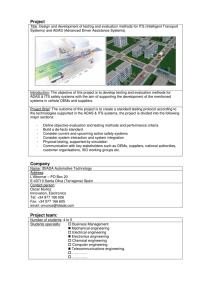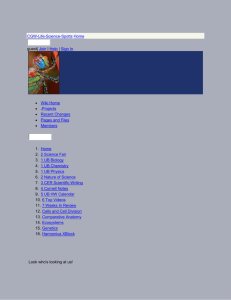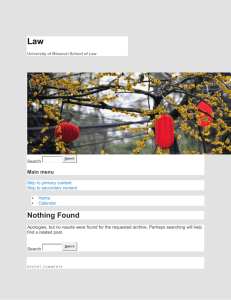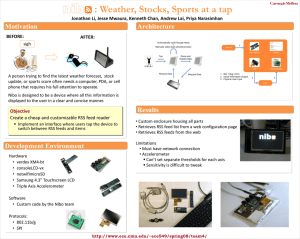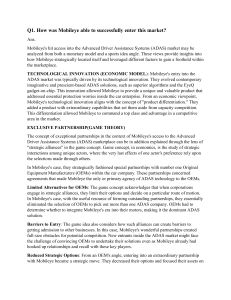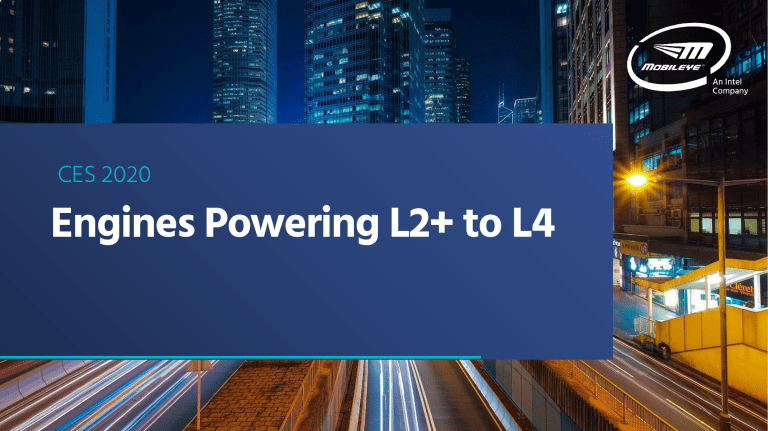
CES 2020 Engines Powering L2+ to L4 Mobileye in Numbers EyeQ Shipped 54M Over EyeQs shipped to date 46 % CAGR In EyeQ shipping since 2014 33 In 2019: Design Wins 28M units over life 4 high-end L2+ wins with 4 major EU and Chinese OEMs 47 Running Programs Globally across 26 OEMs 16 Product Launches Industry first 100° camera with Honda VW high-volume launch (Golf, Passat) Mobileye Solution Portfolio Covering the Entire Value Chain 2025 2022 Today Today L4/ L5 Mobility-as-a-Service L2+/ L2++ L1-L2 ADAS Driver assistance Front camera SoC & SW: AEB, LKA, ACC, and more Conditional Autonomy Scalable proposition for Front vision sensing Full Autonomy Full-Service provider-owning the entire MaaS stack REM HD map SDS to MaaS operators Driver monitoring, surround vision, redundancy SDS as a Product May also include: “Vision Zero”- RSS for ADAS Data and REM® Mapping Crowdsourcing data from ADAS for HD mapping for AV and ADAS Providing smart city eco system with Safety/Flow Insights and foresights L3/4/5 Passenger cars Consumers Autonomy SDS to OEMs Chauffeur mode Scalable robotaxi SDS design for a better position in the privately owned cars segment The ADAS Segment Visual perception Evolution L2+ - The Next Leap in ADAS The opportunity L2+ global volume expectation (M) Source: Wolfe research, 2019 L2+ common attributes Multi-camera sensing HD maps Multi-camera front sensing to full surround to R AG C 63% 3.6 L2+ functionalities range from Everywhere, all-speed lane centring 13 L2+ - significant added value in comfort, not only safety Everywhere, all-speed conditional handsfree driving Higher customer adoption and willingness to pay Significantly higher ASP- 3-15X more than legacy L1-L2 System complexity leads to high technological barrier Mobileye Scalable Solution for L2+ Camera-based 360° sensing is the enabler for the next leap in ADAS 360° cameras sensor suite Affordability allows mass adoption in ADAS Full 3D environmental model Algorithmic redundancy Lean compute platform REM™ HD Maps First in the industry to offer: “HD Maps Everywhere” High refresh rate Entire system running on 2x EyeQ® 5H 3rd party programmability 46 TOPS, 54W Driving Policy layer RSS-based Formal safety guarantees Prevention driven system for ADAS L2+ Business Status More than 70% of the L2+ systems running today are powered by Mobileye’s technology For example: Nissan ProPilot ™ 2.0 VW Travel Assist ™ Cadillac Supercruise ™ Additional 12 active programs with L2+ variants and 13 open RFQs BMW KaFAS 4 Next Generation ADAS Unlocking “Vision Zero” with RSS for Humans Drivers ADAS Today ADAS Future Potential AEB, LKA | Emergency driven ESC/ ESP | Prevention driven AEB, LKA, ESC | All in one Application of brakes longitudinally & laterally Prevention driven system Formal Guarantees Vision Zero Scalable surround CV system RSS Jerk-bounded braking profile longitudinal & lateral Standard fitment/ Rating Under the Hood of Mobileye’s Computer Vision The Motivation Behind Surround CV The goal Why Full stack camera only AV 10−4MTBF for sensing mistake leading to RSS violation (per hour of driving) ~ 10−4 Humans probability of injury per hour of driving ~ 10−6 Humans probability of fatality per hour of driving sensing system desired MTBF (with safety margins) ~10−7 The Driving 10M hours without a safety critical error To meet the 10−7MTBF, we break it down into two independent sub-systems: MTBF 107 ≈ MTBF1103.5 ⋅ MTBF2103.5 Critical MTBF of 104 ≈ 10,000 (with safety margins) hours is plausible. The challenge 10−4 MTBF still requires an extremely powerful surround vision Equivalent to driving 2 hours a day for 10 years without a safety critical sensing mistake Mobileye’s Sensing has Three Demanding Customers Sensing state for Driving Policy under the strict role of independency and redundancy. Smart agent for harvesting, localization and dynamic information for REM based map ADAS products working everywhere and at all conditions on millions of vehicles Comprehensive CV Environmental Model Four General Categories Road Semantics Road-side directives (TFL/TSR), on-road directives (text, arrows, stop-line, crosswalk) and their Driving Path (DP) association.. Road Boundaries Any delimiter/ 3D structure/ semantics of the drivable area, both laterally (FS) and longitudinally (general objects/debris). Road Users 360 degrees detection of any movable road-user, and actionable semantic-cues these users convey (light indicators, gestures). Road Geometry All driving paths, explicitly / partially / implicitly indicated, their surface profile and surface type. Redundancy in the CV Subsystem In order to satisfy an MTBF of 10−4 hours of driving of the CV-Sub-system: This creates internal redundancy layers for both detection and measurements: Appearance based Geometry based Appearance based Geometry based Multiple independent CV engines overlap in their coverage of the four categories Measurements Detection 2D Robust Sensing 3D Object Detection Generated and solidified using 6 different engines Scene segmentation (NSS) VIDAR Detection 3DVD Full image detection Wheels Top View FS 2D to 3D Process Generated and solidified using 4 different engines VIDAR Visual road model Measurements 2D Range Net 3D Map world model (REM) Full Image Detection Two dedicated 360-stitching engines for completeness and coherency of the unified objects map: Vehicle signature Very close (part-of) vehicle in field of view: face & limits Front right cam Rear right cam Front right cam Rear right cam Inter-cameras tracking Object signature network Range Net Metric Physical Range estimation dramatically improve measurement quality using novel methods Range Range net output Traditional classifier output Frame Pixel-level Scene Segmentation Redundant to the object-dedicated networks Catches extremely-small visible fragments of road users; Used also for detecting “general objects”. Surround Scene Segmentation with Instance Front left Front right Rear left Rear right Road Users – open door Uniquely classified , as it is both extremely common, critical, and of no ground intersection Road Users - VRU Baby strollers and wheel chairs are detected through a dedicated engine on top of the pedestrians detection system Parallax Net Parallax Net engine provides accurate structure understanding by assessing residual elevation (flow) from the locally governing road surface (homography). VIDAR “Visual Lidar”: DNN-based Multi-view Stereo Redundant to the appearance and measurement engines handling “rear protruding” objects – which hover above the object’s ground plane. VIDAR Input Front left Rear left Front right Main Parking left Parking right Rear right VIDAR Output DNN based multi-view stereo VIDAR Output DNN based multi-view stereo Road Users from VIDAR Leveraging Lidar Processing Module for Stereo Camera Sensing – “VIDAR” Dense depth image from VIDAR High-res Pseudo-Lidar Upright obstacle ‘stick’ extraction Object detection Obstacle Classification Obstacle classification e.g., how to differentiate a double parked car from a traffic jam Using cues from the environment • • • • • Behavior of other road users What’s in front of the object Object location Opened door Emergency lights Visual perception Road Users Semantics Head/pose orientation Pedestrians posture/gesture. Vehicle light indicators Emergency vehicle/Personnel classification. Emergency vehicle , light indicators Pedestrian understanding Road Users Semantics Pedestrian Gesture Understanding Come closer You can pass Stop! On the phone The full unedited 25min ride is available at Mobileye’s YouTube Channel https://www.youtube.com/watch?v=hCWL0XF_f8Y&t=15s REM Mapping and Data REM Process 1. Harvesting 2 Collecting road and Anonymizing and landmarks through EyeQ-equipped vehicles encrypting REM data 3. Aggregation Generating HD crowdsourced RoadBook for autonomous driving Also available via retrofit solutions 4 5. Localizing Map tile distributed Localizing the car to the car within 10cm accuracy in the road book. REM Volumes Harvesting agreements with 6 major car makers Harvesting: Over 1M Harvesting vehicles in EU by 2020 Harvesting volumes Over 1M Harvesting vehicles in US by 2021 Collecting 6 million km per day from 14M serial production vehicles 12M such as: 10M Volkswagen Golf, Passat, BMW 5 series, 3 series, Nissan Skyline, and more 8M Localization: 3 additional major OEMs Programs for using Roadbook™ for L2+: 6M 4M 1M 2 OEMs 2 OEMs 2 OEMs 2018 2019 2020 2021 2022 REM-data Aggregation RSD Coverage Global Snapshot REM Milestones Mapping all of Europe by Q1 2020 Mapping most of the US by end 2020 REM for Autonomous Driving Already operational and is proving to be a true segment game changer 45 For roads above 45 Mph Maps created in a fully automated process TODAY Contains all static, dynamic, and semantic layers to allows fully autonomous drive Mph For roads below 45 Mph Semi-automated process Full automation in 2021 Las Vegas Fwy, interstate 15 REM map REM in China Data harvesting agreements in China complying with regulatory constraints Strategic collaboration with SAIC Motor for REM data harvesting Accelerate the AV development for passenger vehicles in China Harvesting data in China as part of a collaboration with NIO on L4 synergy for Robotaxi and consumer AV JV agreement with Unigroup to enable the collection, processing, and monetization of data in China The Smart Cities Opportunity Mobileye Data Services Product Portfolio Infrastructure Asset Inventory Automated, AI-powered road asset surveying Efficient asset management, precise GIS data and change detection Strategic collaboration with Ordnance Survey (UK) Pavement Condition Assessment Automated surveying & assessment of road conditions Efficient road maintenance with precise GIS data of surface distress Dynamic Mobility Mapping Near real-time & historical data on movement in the city; dynamic mobility GIS datasets Evidence-based urban planning improvements Infrastructure Asset Inventory Pavement Conditions Assessment 5 levels score 0 – Excellent conditions - requires no repair Road Conditions Score – Poor (5) Pavement Conditions Assessment Cracks and potholes harvester in action Road Conditions Score – Poor (5) Pavement Conditions Assessment Cracks and potholes harvester in action Road Conditions Score – Poor (5) Pavement Conditions Assessment Cracks and potholes harvester in action Visual perception RSS Driving Policy and Driving Experience The Driving Policy Challenge • Do we allow an accident due to a “lapse of judgement” of Driving Policy? • Should the occurrence of “lapse of judgement” be measured statistically? Safety is a technological layer living outside of Machine Learning. It is like “Ethics” in AI - a set of rules. • It all boils down to a formal definition of “what it means to be careful” There is a need for “regulatory science and innovation”. Technological innovation is not sufficient. What is RSS? A formal model for safety, that provides mathematical guarantees for the AV to never cause an accident http://arxiv.org/abs/1708.06374 The Method 01 Defining reasonable boundaries on the behavior of other road users 02 Within the boundaries specified by RSS, one must always assume the worst-case behavior of other agents 03 The boundaries capture the common sense of reasonable assumptions that human drivers make 04 Any action beyond the defined boundaries is not reasonable to assume For Example Ego car A is following car B on a single-lane straight road A The Goal The Implementation The Policy The Guarantees B Efficient policy for A that guarantees not to hit B in the worst-case Safe distance for A to not hit B in the worst-case – under a reasonable assumption on V b max brake Define Dangerous Situation- a time is dangerous if the distance is non-safe Define Proper Response- as long as the time is dangerous, brake until stop Proof by induction More complex situations (n agents) need to prove “no conflicts” (efficiently verifiable) More Complex Situations RSS sets the boundaries of reasonable assumptions for all driving scenarios What is reasonable to assume on B in the scenarios below Multiple Geometry Lateral Maneuvers If B can brake at Bmin brake without violating right-of-way, B will brake, otherwise A must stop If B can brake at B lat min brake , B will brake laterally, otherwise A must brake laterally Occlusions Assuming the max velocity of B dictates the max speed for A B B A A A B In Summary Assuming cooperative behavior on the roadway is the key for drivability and “human-like” driving Formal definition of the “reasonable assumptions” provides mathematical guarantees for safety The parameters dictates the cautiousness and utility tradeoff and allow transparent and concise regulatory framework The RSS adheres to 5 principles: 01 02 03 04 05 Soundness- full compliance with common sense of human driving Completeness- covering all driving scenarios by always assuming the worst case under the reasonable assumptions Usefulness- Policy for efficient and not overlyconservative driving Transparency- The model should be a white-box Efficiently Verifiable- proof of guarantee by induction, insuring no butterfly effect Industry Acceptance The RSS is gaining global acceptance as an Automated Vehicle Safety Standard Previously announced adoptions of RSS: Safety First for Automated Driving (SaFAD) IEEE to define a formal model for AV safety with Intel-Mobileye leading the workgroup Companies involved are: BMW, Daimler, Audi, VW, FCA, Aptiv, Continental, here, Baidu, Infineon Together with 11 industry leaders, we established an industry-wide definition of safety with the SaFAD white paper, based on RSS definitions The new standard will establish a formal mathematical model for safety inspired by RSS principles Industry Acceptance The RSS is gaining global acceptance as an Automated Vehicle Safety Standard China ITS Industry Alliance (C-ITS) to formally approve an RSS-based standard The standard, “Technical Requirement of Safety Assurance of AV Decision Making”, has been released to public and will take effect on March, 2020 • The world’s first standard, based on RSS • Proof point that RSS can handle one of the world’s most challenging driving environments: China • The world’s first proposed parameter set that defines the balance between safety and usefulness The Path to Becoming an End-to-End Mobility-as-a-Service Provider MaaS Business Status Mobileye is forging driverless MaaS as a near term revenue-generating channel > The JV to bring robotaxi MaaS to TelAviv is officially signed > Deploying and testing in Tel-Aviv during this year > Establishing the regulatory framework in Israel > This year Mobileye will start using Nio ES8 for AV testing and validation > In 2022 launching a next-gen platform with Mobileye’s L4 tech offered to consumers in China > Robotaxi variant will be launched exclusively for our robotaxi fleets > RATP and Mobileye partnered with the City of Paris to deploy a driverless mobility solution > The first EU city where testing with Mobileye’s AV will start this year > Daegu City and Mobileye announce today a partnership to start testing robotaxi MaaS in South Korea this year > Deployment during 2022 Our Self-Driving-System HW Generations EPM 6 EPM 59 EPM 52 > In deployment > Up to 2x EQ5H > Up to 7x8MP + 4x1.3MP Up to 48 TOPs > Deployment in 2023 > Single EQ6H to support E2E functionality > Deployment in Q2 2020 > Up to 6x EQ5H > Additional 2-3 for FOP > Additional EQ6H FOP Up to 220 TOPs > E2E support in all aspects- fusion, policy, control Up to 216 TOPs Main Takeaways 01 L2+ a growing new category for ADAS where Surround-CV unlocks considerable value at volume production cost. 02 Realization of (safe) L4 and unlocking the full potential of L2+ requires Surround-CV at a standalone (end-to-end) quality 03 L2+ required HD-map-everywhere at growing use-case (types of roads) L4 requires HD-maps Consumer-AV requires HD-maps-everywhere Automation at scale is enabled by crowd-sourced data (REM) 04 Crowd-sourced data from ADAS-enabled vehicles (REM) unlocks great value for Smart Cities 05 To unlock the value of automation there is a need for “regulatory science” (RSS) 06 The road to Consumer-AV goes through Robotaxi MaaS Thank You!
